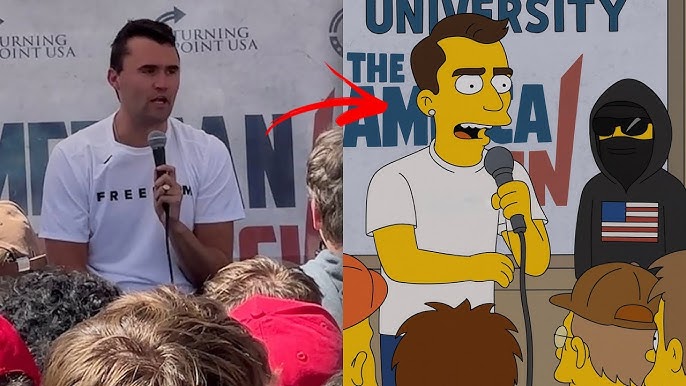A Disturbing Rumor Emerges
In the ever-blurring line between satire and insensitivity, few stories have shaken audiences as much as the rumor now swirling around an unreleased episode of The Simpsons. Online whispers claim that the long-running animated series produced, but never aired, an episode that cruelly parodied the tragic life and death of conservative activist Charlie Kirk.
According to these unverified claims, the episode mocks Kirk’s personal struggles, his faith, and even his untimely passing — recasting them as cartoonish punchlines rather than the solemn realities they represent. While no official confirmation has emerged, the very existence of such a rumor has ignited an emotional storm across social media, leaving many to ask: how far is too far when it comes to satire?
The Legacy of Charlie Kirk

Charlie Kirk, founder of Turning Point USA and a polarizing figure in American politics, died young — his life cut short in a moment that stunned both allies and critics. Admirers remembered him as a bold defender of conservative values, while detractors viewed him as divisive. Yet even those who opposed him politically largely acknowledged the gravity of his death.
Kirk’s widow, Erika, won praise and criticism alike for her decision to forgive the man responsible for her husband’s death, citing her Christian faith as the source of her strength. It was an act many described as extraordinary — an act of grace in the face of unimaginable pain.
To imagine this human story of love, loss, and forgiveness turned into a mocking caricature has left many shocked, even if the rumor of the supposed Simpsons episode turns out to be nothing more than online myth.
Why The Simpsons?
Part of what makes this rumor so explosive is the cultural weight of The Simpsons. For decades, the animated sitcom has been both praised and criticized for lampooning American life. From political leaders to Hollywood celebrities, almost no public figure has escaped its satirical gaze.
The show’s “predictions” — from Donald Trump’s presidency to global events — have become internet lore, often exaggerated or misrepresented but impossible to ignore. The claim that The Simpsons predicted, or exploited, Kirk’s life taps into this mythology. Fans ask: if the show did parody Kirk, was it simply more satire? Or has satire finally crossed the line into cruelty?
The Anatomy of a Rumor

Investigating the origins of the claim reveals the classic anatomy of viral misinformation. Posts began appearing in niche online forums in late summer, claiming that a “lost episode” existed, featuring a character suspiciously similar to Kirk. Screenshots — grainy and unverifiable — soon followed, showing a cartoon figure delivering lines that mocked themes central to Kirk’s career and faith.
From there, the story spread like wildfire. Some social media influencers framed it as fact, while others presented it as conspiracy. The truth remains murky, but what’s undeniable is how easily the story tapped into the public’s appetite for controversy.
Fans React With Anger and Sadness
On Twitter, Instagram, and TikTok, the responses have been polarized but overwhelmingly emotional.
-
Supporters of Kirk see the rumor as an unforgivable insult, proof that even death does not shield someone from ideological attacks. “Turning a tragedy into a punchline is disgusting,” one user wrote.
-
Fans of The Simpsons are split. Some dismiss the story as another baseless internet hoax, while others admit they would not be surprised given the show’s history of pushing boundaries.
-
Neutral observers question why society continues to blur the line between entertainment and cruelty. “Whether or not the episode exists,” wrote one commentator, “the fact that people believe it could exist says everything about where we are culturally.”
The Question of Respect for the Dead
At the heart of the outrage lies a deeper question: what responsibility do creators and audiences have to respect the memory of the deceased? In an age where parody, memes, and satire dominate the online landscape, death itself often fails to act as a boundary.
From comedians making tasteless jokes days after celebrity deaths, to memes that trivialize tragedy, the internet has become a place where mourning and mockery often collide. The supposed Kirk episode of The Simpsons, real or imagined, has become a symbol of this larger cultural problem.
Forgiveness vs. Exploitation
Ironically, one of the most powerful aspects of Kirk’s legacy — his wife’s decision to forgive — highlights the stark contrast between grace and cruelty. While Erika Kirk chose to demonstrate compassion, online trolls chose to distort her husband’s memory for amusement or political gain.
The rumor of the Simpsons episode forces us to consider: if forgiveness can be turned into fodder for parody, is anything sacred?
The Simpsons’ Silence
Thus far, neither Fox nor the producers of The Simpsons have commented on the rumor. For some, this silence is further “proof” that the episode exists and has been buried due to its offensiveness. For others, it is simply recognition that addressing baseless claims often gives them more oxygen than they deserve.
Either way, the absence of an official response has only fueled speculation, allowing the story to take on a life of its own.
The Larger Cultural Mirror
What may matter most is not whether the episode exists, but why so many find the rumor believable. It speaks to a broader cultural cynicism — a belief that media will exploit anything for attention, that satire will cannibalize even the most painful human stories.
In that sense, the rumor functions as a cultural mirror, reflecting both our appetite for controversy and our exhaustion with a world where everything feels commodified.
A Call for Decency
As the dust settles, one message rings clear: there must be a line between satire and cruelty, between parody and exploitation. Charlie Kirk’s story, however one views him politically, was a human story of life and loss. To twist it into cartoon parody — whether as rumor or reality — cheapens not only his memory but our collective humanity.
For Erika Kirk, forgiveness was her answer to pain. For society, perhaps the answer should be respect.
Conclusion
The alleged Simpsons parody of Charlie Kirk may never be proven real. It may remain one of countless internet legends, an urban myth born from our culture’s obsession with shock value. But the emotions it has stirred — anger, sadness, reflection — are very real.
The story forces us to reckon with the role of satire in modern life, the boundaries of humor, and the responsibility we all share to treat the dead, and the living, with dignity.
Whether the episode exists or not, the lesson remains: tragedy should never be reduced to a punchline.
Tragedy on the Track: Fans Across China Left Heartbroken as Wang Yibo’s Beloved Racing Hobby Takes a Shocking Turn — The Whispered Words Witnesses Say They Heard Have Sparked Tears and Endless Questions
China is reeling from shocking news surrounding beloved actor, singer, and racer Wang Yibo, after an unexpected incident during a high-speed race left fans across the country in shock. Known not only for his screen presence and music but also for his fearless passion for motorsports, Wang’s love of racing had always drawn admiration. But this time, the race did not end as it usually did.

According to eyewitnesses, the accident unfolded suddenly, stunning the crowd in attendance. For a brief moment, silence fell over the track before confusion and panic spread. Emergency teams rushed in, while those nearby reported hearing a faint, emotional whisper from Wang Yibo himself — words that have since spread across social media, breaking the hearts of millions.
Though officials have yet to release full details of the incident, fans have been flooding online platforms with messages of prayer, sorrow, and disbelief. “He always lived life so fully, and he inspired us to be fearless,” one supporter wrote. Another added, “Hearing about his final words feels like he was speaking directly to us — a message we’ll never forget.”

The Chinese entertainment industry has also been shaken, with colleagues, producers, and friends expressing their devastation. Many describe Wang not just as a star, but as a young man of remarkable drive and sincerity, who balanced his career with his love for racing and adventure.
For now, questions remain about the full circumstances of what went wrong on the track, but one thing is certain: the moment has left a scar on the hearts of countless admirers. What was meant to be just another adrenaline-filled race has instead become a story of grief, love, and mystery — one that will be remembered for years to come.